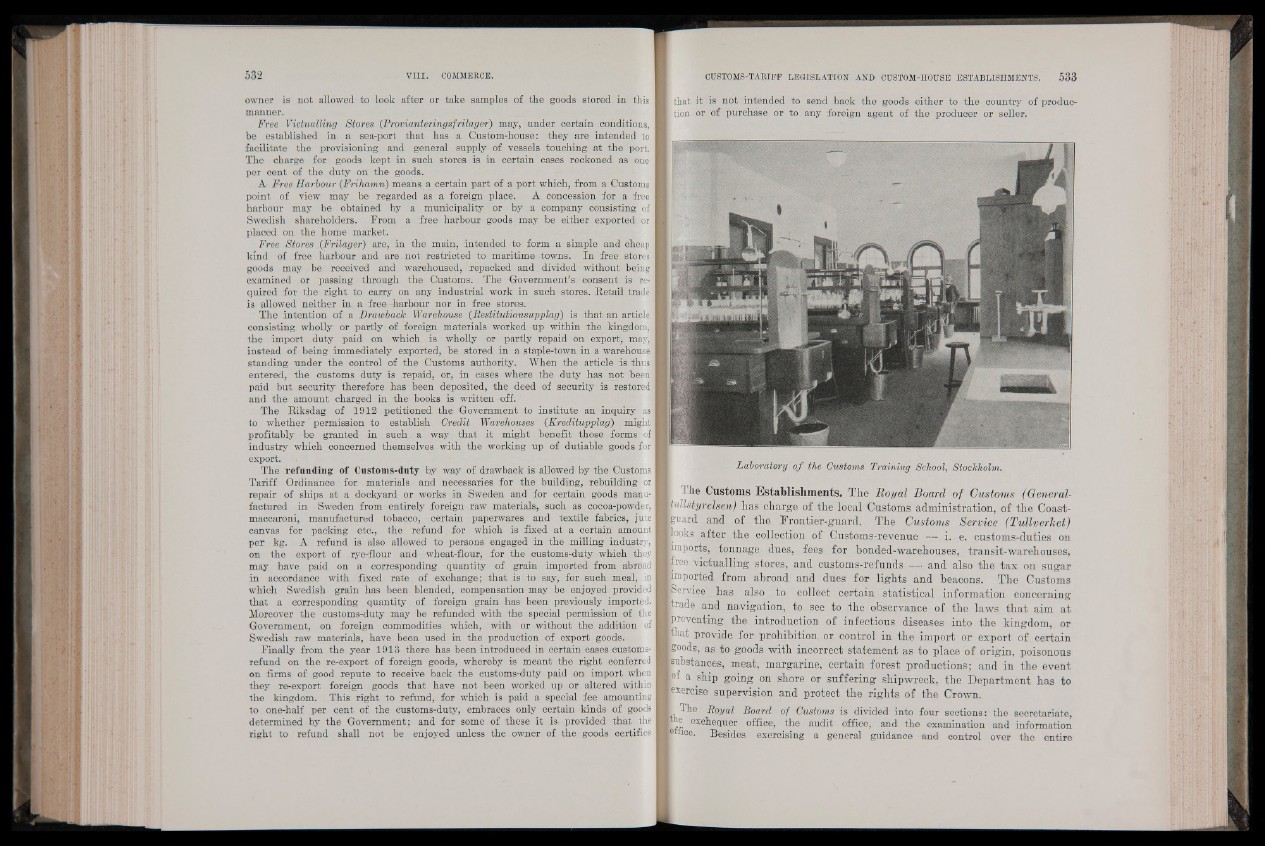
owner ia not allowed to look after or take samples of the goods stored in this
manner.
Free Victualling Stores (Provianteringsfrilager) may, under certain conditions,
be established in a sea-port that has a Custom-house: they are intended to
facilitate the provisioning and general supply of vessels touching at the port.
The charge for goods kept in such stores is in certain cases reckoned as one
per cent of the duty on the goods.
A. Free Harbour (Frihamn) mean\ a certain part of a port which, from a Customs
point of view may be regarded as a foreign place. A concession for a free
harbour may be obtained by a municipality. or by a company consisting of
Swedish shareholders. From a free harbour goods may be either exported or
placed on the home market.
Free Stores (Frilager) are, in the main, intended to form a simple and cheap
kind of free harbour and are not restricted to maritime towns. In free stores
goods may be received and warehoused, repacked and ^divided without being
examined or passing through the Customs. The Government’s consent. is required
for the right to carry on any industrial work in such stores. Retail trade?
is allowed neither in a free harbour nor in free stores.
The intention of a Drawback Warehouse (Bestitutionsupplag) is that an article
consisting wholly or partly of foreign materials worked up within the kingdom,
the import duty paid on which is wholly or partly repaid on export, may,
instead of being immediately exported, be stored in a staple-town in a warehouse',
standing under the control of the Customs authority. When the article is thus)
entered, the customs duty is repaid, or, in cases where the duty has not been)
paid but security therefore has' been deposited, the deed of security is restored
and the amount charged in the books is written off.
The Riksdag of 1912 petitioned the Government to institute an inquiry1 as:
to whether permission to establish Credit Warehouses (Kreditupplag) might
profitably be granted in such a way that it might benefit those forms' of
industry which concerned themselves with the working up of dutiable goods for
export.
The refunding of Customs-duty by way of drawback is allowed by the Customs
Tariff Ordinance for materials and necessaries for the building, rebuilding or
repair of ships at a dockyard or works in Sweden and for certain goods manufactured
in Sweden from entirely foreign raw materials, such as coeoa-powder,
maccaroni, manufactured tobacco, certain paperwares and textile fabrics, ,jute
canvas for packing etc., the refund for which is fixed at a certain amount
per kg. A refund is also allowed to persons engaged in the milling industry,
on the export of rye-flour and—wheat-flour, for the customs-duty which, they*
may have paid on a corresponding quantity of grain imported from abroad
in accordance with fixed rate of exchange; that is to say, for such meal,;, in
which Swedish grain has been blended, compensation may be enjoyed provided
that a corresponding quantity of foreign grain has been previously imported.
Moreover the customs-duty may be refunded with the special permission of the
Government, on foreign commodities which, with or without the addition|of
Swedish raw materials, have been used in the production of export goods.
Finally from the year 1913 there has been introduced in certain cases customs-
refund on the re-export of foreign goods, whereby is meant the right conferred
on firms of good repute to receive back the customs-duty paid on import when
they re-export foreign goods that have not been worked up or altered within
the kingdom. This right to refund, for which is paid a special fee amounting
to one-half per cent of the customs-duty, embraces only certain kinds of goods
determined by the Government; and for some of these it is provided that the
right to refund shall not be enjoyed unless the owner of the goods certifies
that it is not intended to send back the goods either to the country of production
or of purchase or to any foreign agent of the producer or seller.
Laboratory o f the Customs Training School, Stockholm.
| The Customs Establishments. The Royal Board of Customs (General-
Iullstyrelsenj has charge of the local Customs administration, of the Coastguard
and of the Erontier-guard. The Customs Service (Tullverket)
looksafter the collection of Customs-revenue — i. e. customs-duties on
imports, tonnage dues, fees for bonded-warehouses, transit-warehouses,
free victualling stores, and customs-refunds — and also the tax on sugar
pnported from abroad and dues for lights and beacons. The Customs
jService has also to collect certain statistical information concerning
pade and navigation, to see to the observance of the laws that aim at
preventing the introduction of infectious diseases into the kingdom, or
p a t provide for prohibition or control in the import or export of certain
poods, as to goods with incorrect statement as to place of origin, poisonous
jsubstances, meat, margarine, certain forest productions; and in the event
Pf a ship going on shore or suffering shipwreck, the Department has to
exercise supervision and protect the rights of the Crown.
I Royal Board o f 1 Customs is divided into four sections: the secretariate,
| ® exchequer office, the audit office, and the examination and information
p ic e . Besides exercising a general guidance and control over the entire